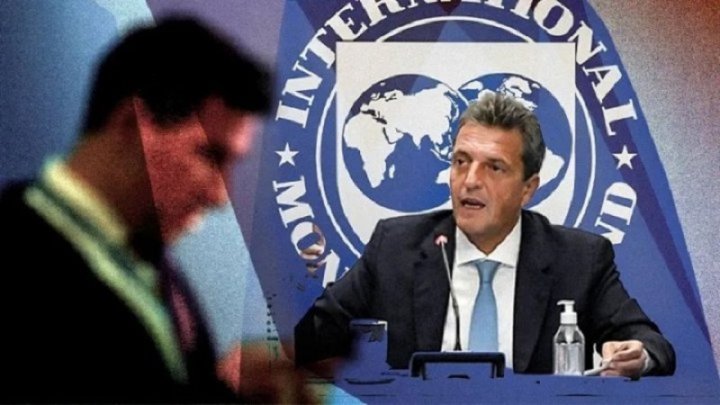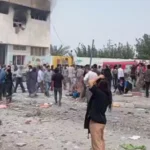
This Friday night was finally defined the unity formula of Unión por la Patria for the presidential elections. After many hours of circus and speculation within Peronism, it was announced that Sergio Massa will be the candidate for president accompanied by Agustín Rossi as vice. In this way, the proposals for “Wado” by Pedro and Daniel Scioli would be “downloaded” separately, although unknowns and definitions remain in the coming hours.
The formula “Massa-Rossi” far from expressing any criticism with the current direction of the government, confirms it: his Minister of Economy, key in the adjustment that has been applied to the vast majority of workers, together with the chief of staff of Alberto Fernandez, which also has the support of Cristina Kirchner, as she has been doing with the management of Massa in Economy. Sergio “born on July 4” Massa, paying constant homage to the Yankee embassy, promoter of extractivism and friend of the governors “feudal lords” of the NOA, such as Gerardo Morales in Jujuy -to which he did not dedicate a single tweet criticizing the savage repression this week- now it will be Peronism’s commitment to show the IMF and big businessmen that they can continue guaranteeing their businesses, we will have to see if they receive the same support at the polls after the failure that the government is going through.
Massa in the Front of All / Union for the Homeland
Sergio Massa assumed as economy minister in September 2022after being president of the Chamber of Deputies upon assuming the management of the Frente de Todos, due to the resignation of Martin Guzman and the fleeting passage of Silvina Batakis by the wallet, in the middle of a crisis devaluatoria.
As president of the Chamber of Deputies representing this political space, he had been playing the role of enforcing the laws that the Government requiredthat since At first they had a clear orientation to legitimize the Macrista legacy and prepare the ground for adjustment plans.: cancel retirement mobility that was going to benefit the elderly in December 2019, sanction adjustment budgets and, finally, the agreement with the IMF whose harsh consequences we are experiencing.
Since he took office as Minister of Economy, he had a central role in the government, the so-called “Super Minister”, due to the reorganization of the area that unified the ministries of Economy, Productive Development and Agriculture, Livestock and Fisheries, which, together with political weakness of the Frente de Todos government, aggravated by the profound economic debacle, gave Massa a position of enormous power.
The political support he obtained from Cristina Kirchner and the Kirchner sector of unions and social movements was essential for Massa to be able to apply the agreement with the IMF. In his recent speech from the Frente Renovador congress, The minister boasted of having exceeded the spending adjustment goals required by the Fund at the end of 2022as one of the achievements that position him as a candidate for president.
So these weeks Massa can offer a great gift to Kristalina Georgieva: eleven consecutive months of real monthly falls in primary spending. Between the cuts are pensions and family allowances, as published by the Congressional Budget Office. “Sergio” did it, the Minister of Economy endorsed by Kirchnerism, managed to continue with the spending cuts that Martín Guzmán was questioned so much.
However, not only was the adjustment brutal, but the economy continues to hang by a fragile thread, the shortage of Central Bank reserves, the threat of further devaluation and inflation that breaks historical records: Massa did not solve any of the problems that supposedly he had proposed. One more course in the unfulfilled promises of the Frente de Todos government.
right-wing record
The son of a construction businessman, Massa studied law at the University of Belgrano. His political origins go back to his adolescence, when he joined the ranks of the UCedéthe liberal right-wing party founded by Álvaro Alsogaray.

In the mid-90s, Massa was one of the members of this party who He promoted the merger with Menemism, and that is how he joined the ranks of the PJwhere it began at the hands of the gastronomic Luis Barrionuevo and the deputy Graciela Camano.
During those years, he held a position in the Ministry of the Interior and was an adviser to “Palito” Ortega. Later he would be appointed by Eduardo Duhalde as Executive Director of Ansesa role that he would retain during Kirchnerism until he was elected mayor of Tigre in 2007. In 2008 he would return to the national government as Chief of Staff for Cristina Fernández, with whom he broke up in 2009, when he took over again as mayor of Tigre.
After his break with Kirchnerism, WikiLeaks cables revealed his fluid relationship with officials from the United States Embassy in Buenos Aires. In those dialogues they saw their clearly anti-worker positions when he supported the multinational company Kraft-Terrabusi, which in 2009 carried out massive layoffs. The cables say that “Massa said three times that he believed the company was in the right when he fired 155 workers for not showing up to work in July. He insinuated that the union leaders at the plant are extortionate and unreasonable.”

towards the replacement of 2015, Massa was a candidate for president. Among his most outstanding proposals were the idea of taking the Armed Forces to the streets. He also violently attacked the workers at the education, accusing them of absenteeism. It was Nicolás del Caño who unmasked him in the presidential debate, showing that the one who was “absent” from his work was him, in the Chamber of Deputies.
It was in these 2015 elections that his closeness to Gerardo Morales, the governor of Jujuy, who responded with sticks, tear gas, bullets, and terribly violent arrests against teachers, youth, and native communities who demand “Up the wages,” was best illustrated. Down with the Reformation”. The radical supported Massa’s presidential candidacy and he in turn supported the Jujeño’s candidacy for governor. So much so, that he “contributed” to the lieutenant governor, Carlos Haquim. not coincidentally, Massa remains silent in the face of the repression carried out this weekend by order of Gerardo Morales. The link between the two continues to this day, and even the Minister of Economy tried until the last moment to get the UCR bloc to support the appointment of Cecilia Moreau as president of the Chamber of Deputies in 2022.

Without going further, Gustavo Sáenz is part of the Frente Renovador and governs Salta with the same methods: repressing the teachers who came out to fight for their salaries.
During macrismo, Massa was one of the central actors of Peronism that allowed Cambiemos to vote on the adjustment laws and delivery in the National Congress, starting with the approval of the agreement with the vulture funds that began a phenomenal cycle of indebtedness whose consequences are dramatically experienced today and mortgage the history of our country for decades if we do not turn history around.
In recent years, and after a strong confrontation with Cristina Kirchner during which she asked to put the current vice president in jailMassa ended up declining his presidential aspirations to join the Frente de Todos, where the different factions of Peronism were reconciled to return to the Government.
The failure and crisis of representation
With the candidacy of Sergio Massa, he shows the commitment of Peronism to position itself as the one who can guarantee governability and at the same time the adjustment requested by the large business and financial sectors. However, the failure of the Frente de Todos / Unión por la Patria government is undeniable in the eyes of anyone, as is the deep crisis that is going through the two great coalitions that have already governed. Despite the maneuvers to close unit lists in this case, or competing in the PASO as Juntos, they have not been able to regain adherence due to the serious economic crisis that the country is going through as a result of their efforts.
Without a doubt, Massa candidate is a continuation of the strategy of political “moderation” that Peronism has been proposing to “confront with the right”, with the experience of the Frente de Todos as the best exponenthas been resulting in the facts in the advance of sectors of the right.
This moderation included leaving the so-called “Macrista inheritance” standing with the payment of the debt to the IMF, supporting an agro-export model and job insecurity for decades, even with the presidencies of Néstor and Cristina. The result is the deepening of inequality where those who concentrate the profits are left with a growing portion of the pie, while the workers and popular sectors sink into poverty.
The recent example of Jujuy, where Peronism was essential for Gerardo Morales to approve the constitutional reform against poor working people and native communities is his latest expression. Morales, and central governor for the extractivist exploitation of lithium, “Sergio” did not express any disapproval of the repression, claimed as a government plan of the entire arc of JxC.
From the sidewalk opposite to this scenario, is the Unity Left Front. Myriam Bregmannpre-candidate for president together with Nicholas del Caño stated in the presentation of the list today regarding Unión por la Patria, Juntos por el Cambio and Milei: “They agree that the IMF continues to dominate the national economy and that the crisis is once again paid for by the working people, while We have a program of struggle to defeat the adjustment, that the crisis be paid for by the big bankers and big businessmen, and to reorganize the country from below with a government of the workers.”
Source: www.laizquierdadiario.com

